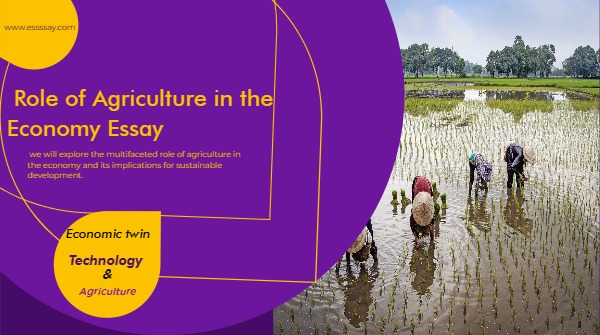Agriculture plays a vital role in the economy by contributing to various aspects of a nation's development. From historical significance to modern-day advancements, agriculture remains an essential sector that sustains livelihoods, provides food security, generates employment, and boosts economic growth. In this essay, we will explore the multifaceted role of agriculture in the economy and its implications for sustainable development.
Introduction
Agriculture has been the backbone of civilizations for thousands of years. It enabled early societies to settle and form communities, leading to the development of advanced cultures. Even in the modern era, agriculture continues to be a fundamental sector, supporting the growth of nations and ensuring their prosperity.
Historical Perspective
Looking back at the historical significance of agriculture, we can observe how early civilizations relied on farming practices to meet their basic needs. The transition from hunter-gatherer societies to agrarian communities marked a significant turning point in human development. As agricultural techniques improved, surplus food production became possible, leading to the emergence of trade and specialization.
Contribution to GDP
The agricultural sector contributes significantly to a country's Gross Domestic Product (GDP). It encompasses farming, livestock rearing, forestry, and fisheries. According to recent statistics, agriculture accounts for X% of the GDP in many nations. This highlights its economic significance and the pivotal role it plays in driving overall growth.
Employment Generation
One of the key benefits of agriculture is its potential to generate employment opportunities. The sector provides livelihoods for a substantial portion of the population, especially in rural areas. Farmers, farm laborers, and individuals engaged in agro-processing industries form the backbone of agricultural employment. These jobs not only contribute to local economies but also help alleviate poverty and reduce migration from rural to urban areas.
Food Security
Agriculture plays a crucial role in ensuring food security. By producing an ample supply of food, the sector helps meet the nutritional needs of the population. Adequate food availability and accessibility are essential for the overall well-being and development of a nation
Foreign Exchange Earnings
Agricultural exports play a significant role in earning foreign exchange for a country. Many nations rely on agricultural products as a major source of revenue from international trade. These exports include crops, livestock products, processed food items, and raw materials. By participating in global markets, agricultural economies can strengthen their balance of payments and enhance economic stability.
Promoting agricultural trade is crucial for maximizing foreign exchange earnings. This can be achieved through the development of export-oriented agricultural policies, the improvement of quality standards, and the establishment of efficient supply chains. Encouraging farmers to engage in export-oriented production and providing them with the necessary support can boost agricultural exports and contribute to the overall economic growth of a nation.
Foreign exchange earnings from agriculture not only support the economy but also contribute to the development of rural areas by providing farmers with better access to markets and higher incomes. This, in turn, leads to improved standards of living, increased investments in infrastructure, and enhanced social services.
In summary, agriculture plays a vital role in generating foreign exchange earnings for a country. By focusing on agricultural exports, nations can leverage their natural resources, enhance trade relationships, and foster economic growth.
Rural Development
Agriculture plays a significant role in rural development, contributing to the overall growth and well-being of rural areas. The agricultural sector acts as a catalyst for rural transformation by providing employment opportunities, improving infrastructure, and reducing poverty.
Agricultural activities create direct and indirect employment opportunities in rural communities. Farmers, farm laborers, and individuals engaged in agro-processing industries find livelihoods through agriculture. This not only improves the income levels of rural households but also helps reduce unemployment and migration to urban areas.
Furthermore, agricultural development leads to the improvement of rural infrastructure. As agriculture thrives, there is a need for better irrigation systems, roads, storage facilities, and market access. Investment in rural infrastructure not only supports agricultural activities but also enhances connectivity and accessibility to essential services such as healthcare and education.
Agriculture also contributes to poverty reduction in rural areas. By providing income-generating opportunities and access to nutritious food, agriculture helps uplift communities from poverty. Government programs and initiatives that prioritize agricultural development, provide financial support, and facilitate knowledge transfer further aid in poverty alleviation.
Moreover, the growth of agriculture in rural areas has a multiplier effect on the local economy. As farmers earn higher incomes, they have increased purchasing power, leading to increased demand for goods and services in the community. This, in turn, stimulates the growth of small businesses and other sectors, creating a positive economic cycle.
To promote rural development through agriculture, it is essential to focus on empowering smallholder farmers, providing them with training, access to credit, and market linkages. Additionally, investment in rural education, healthcare, and social services is crucial for improving the overall quality of life in rural areas.
Technological Advancements
Technological advancements have revolutionized the agricultural sector, leading to increased productivity, efficiency, and sustainability. The adoption of modern technologies in agriculture has transformed traditional farming practices and opened up new possibilities for agricultural development.
One of the key impacts of technology in agriculture is increased productivity. Advanced machinery, such as tractors, harvesters, and irrigation systems, has reduced manual labor and improved the efficiency of agricultural operations. Precision farming techniques, enabled by technologies like GPS and remote sensing, allow farmers to optimize the use of fertilizers, water, and pesticides, resulting in higher crop yields.
Furthermore, innovations in seed technology and genetic engineering have led to the development of high-yielding and disease-resistant crop varieties. These genetically modified crops have the potential to address food security challenges by improving crop quality, enhancing resistance to pests and diseases, and increasing overall agricultural productivity.
Technology also plays a vital role in promoting sustainable agriculture. The use of precision agriculture techniques helps minimize resource wastage and environmental impact. Farmers can precisely monitor soil conditions, water levels, and nutrient requirements, leading to better resource management and reduced ecological footprint.
Digital technologies have also transformed agricultural information systems. Access to real-time weather data, market information, and farming best practices empowers farmers to make informed decisions and adapt to changing conditions. Mobile applications and online platforms provide platforms for knowledge-sharing, connecting farmers with experts, and facilitating agricultural extension services.
To fully harness the potential of technology in agriculture, it is essential to ensure equitable access to these innovations. Smallholder farmers, who make up a significant portion of the agricultural workforce, should have access to affordable technologies and the necessary training and support to adopt and adapt to new tools.
In conclusion, agriculture is a vital driver of rural development. It generates employment, improves infrastructure, reduces poverty, and stimulates economic growth in rural communities. By prioritizing agricultural development and implementing targeted policies, nations can ensure inclusive and sustainable rural development, leading to balanced economic growth.
Conclusion
In conclusion, agriculture plays a crucial role in the economy by contributing to various aspects of development. From its historical significance to its modern-day impact, agriculture remains an essential sector that sustains livelihoods, provides food security, generates employment, earns foreign exchange, promotes rural development, and embraces technological advancements.
While the agricultural sector faces challenges, governments, individuals, and organizations continue to work towards overcoming these obstacles and realizing the full potential of agriculture. By recognizing its importance and implementing supportive policies, societies can harness the power of agriculture to achieve economic growth, alleviate poverty, and foster environmental sustainability.
It is important for individuals to support the agricultural sector by making informed choices, advocating for sustainable practices, and engaging with local farmers and communities. Together, we can contribute to a thriving agricultural sector that nourishes populations, preserves natural resources, and creates a sustainable future for generations to come.
FAQs
How does agriculture contribute to economic growth?
Agriculture contributes to economic growth by generating employment, earning foreign exchange, and driving overall development through its impact on GDP.
What are the main challenges faced by the agricultural sector?
Challenges in the agricultural sector include climate change, limited access to resources, market fluctuations, and the need for sustainable farming practices.
How can technology improve agriculture?
Technology can improve agriculture by increasing productivity, optimizing resource use, facilitating precision farming, and enabling better market access and information dissemination.
What role does the government play in promoting agriculture?
Governments play a crucial role in promoting agriculture through supportive policies, investments in infrastructure, research and development initiatives, and ensuring market access for farmers.









No comments:
Post a Comment
Edit your Comment